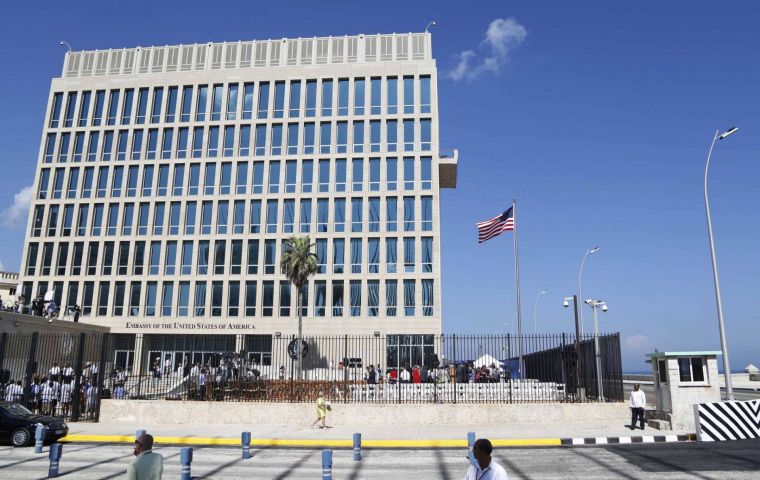MercoPress. South Atlantic News Agency
Mystery brain illness of US and Canada embassy staff in Havana remains unsolved
 The finding does little to resolve the cause of a string of mysterious health incidents that led the administration of President to withdraw many personnel from Cuba.
The finding does little to resolve the cause of a string of mysterious health incidents that led the administration of President to withdraw many personnel from Cuba. Advanced brain scans of U.S. Embassy employees who reported falling ill while serving in Havana revealed significant differences from a control group, according to a new study published on Tuesday.
The finding does little, however, to resolve the cause of a string of mysterious health incidents that led the administration of U.S. President Donald Trump to withdraw many personnel from Cuba.
University of Pennsylvania researchers said symptoms described by the embassy workers may be reflected in their brain scans when compared with those of healthy volunteers.
The difference “is pretty jaw-dropping at the moment,” lead researcher Dr Ragini Verma, a professor of radiology at the university said in a phone interview.
“Most of these patients had a particular type of symptoms and there is a clinical abnormality that is being reflected in an imaging anomaly,” she said.
However, in findings published by the Journal of the American Medical Association (JAMA), Verma and her colleagues said it was not clear if the brain patterns directly translated into meaningful health problems. Initial MRI scans of 21 Havana embassy workers had revealed no abnormalities.
In a statement, the Cuban government said the study was not coherent with previous ones and only served to muddy the picture further. It said it also did not help get any closer to the reason for the ailments reported by the diplomats.
A U.S. State Department spokesperson said, “The department is aware of the study and welcomes the medical community's discussion on this incredibly complex issue.”
The health problems of more than two dozen workers surfaced in 2016 after the administration of former President Barack Obama reopened the embassy in an effort to improve relations with the Castro family run island nation. Most of the employees were removed from Cuba in 2017.
Symptoms included headache, ringing in the ears, sleep disturbances, trouble thinking, memory problems, dizziness and balance problems.
Trump has said Cuba was responsible for what the U.S. State Department called “significant injuries” suffered by the workers. Canadian embassy workers complained of similar mysterious health problems and were also removed from Cuba. Cuban officials have denied any involvement.
In an earlier JAMA report, the university team described the injuries experienced by the first 21 diplomats it examined as like a concussion without a blow to the head.
Some researchers have questioned whether the study findings are significant.
“Finding evidence of brain change doesn't provide evidence of brain injury or damage,” said Dr Jon Stone, a professor of neurology at the Centre for Clinical Brain Sciences at the University of Edinburgh, who was not involved in the study.
Dr Sergio Della Sala, a professor of human cognitive neuroscience, also at the University of Edinburgh, noted that 12 of the affected workers who had a history of concussion prior to going to Cuba were included in the analyses.
“In comparison, none of the controls declared previous brain injury. This in itself could cause statistical group differences,” Della Sala said.
Sceptics have challenged State Department assertions that some unknown weapon had attacked the workers.




Top Comments
Disclaimer & comment rulesCommenting for this story is now closed.
If you have a Facebook account, become a fan and comment on our Facebook Page!